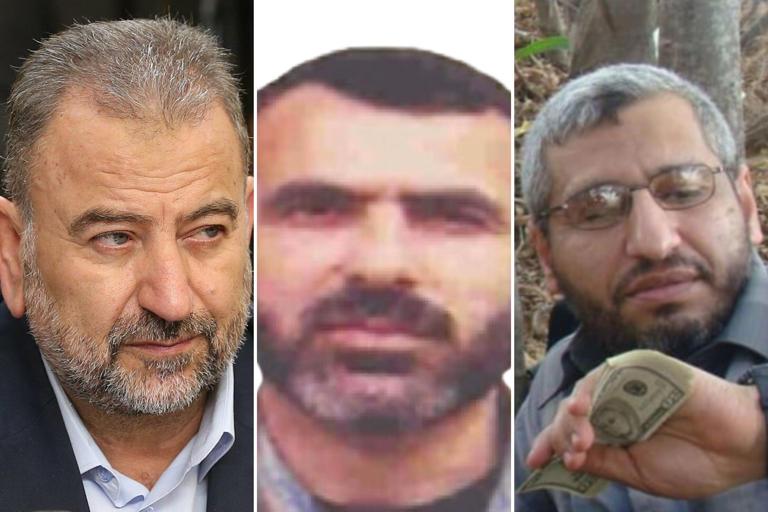
Israel Has Nearly Wiped Out Hamas’ Military Leadership
In the nearly ten months since Israel declared war on Palestinian militant group Hamas, Israel’s military has said it has killed a string of the organization’s most senior figures, including its military chief.
Estimates pulled from sources from the Israeli military suggest up to 80 percent of the senior leadership of Hamas’ armed faction have been taken out, said Burcu Ozcelik, a senior research fellow for Middle East security with the London-based Royal United Services Institute (RUSI) think tank.
On Thursday, the Israeli military said Mohammed Deif, the head of Hamas’ military wing—also known as the Izzedine al-Qassam Brigades—had been killed in a “precise, targeted strike” on a compound in the southern Gazan city of Khan Yunis in mid-July.
“Following an intelligence assessment, it can be confirmed that Mohammed Deif was eliminated in the strike,” the Israeli military said in a statement. Hamas has not commented.
Israel said at the time of the strike that it had killed Rafa’a Salameh, the commander of Hamas’ Khan Yunis Brigade.
The deputy commander of the Izzedine al-Qassam Brigades, Marwan Issa, died in an air strike in March, while the founding commander of Hamas’ military wing, Saleh al-Arouri, died in an explosion in Lebanon in January.
Israel has taken out up to four of every five senior Izzedine al-Qassam Brigades commanders, Ozcelik said, plus an estimated 15,000-20,000 trained Hamas fighters.
“The military ratio is usually one dead to three wounded, which from the Israeli calculus means that a significant number of the Hamas fighting force has been dismantled, with many fighters captured in Israeli prisons,” Ozcelik told Newsweek.
Israel has been waging war against Hamas—designated a terrorist organization by the U. S.—since October 7, when it carried out an unprecedented attack on Israel that Israeli officials say killed around 1,200 people, mostly civilians. More than 200 people were taken hostage and more than 100 are still being held captive, with around a third presumed dead.
Israel vowed to eradicate Hamas, launching a relentless aerial bombing campaign on the densely-populated Gaza Strip, followed by intensive ground operations. The war has killed nearly 40,000 Palestinians since October, according to the Hamas-run Gaza health authorities, with huge humanitarian concerns raised by the international community. Efforts to secure a ceasefire have so far failed.
The Israeli military says it is committed to tearing apart Hamas’ chain of command, destroying its infrastructure—such as the miles of underground tunnels snaking under Gazan cities—and killing Hamas operatives.
Experts say taking out the group’s leadership is a tactic designed to grind down Hamas until the organization is unable to function effectively, ultimately forcing it to agree to unfavorable ceasefire terms and return the remaining hostages.
Alongside the military wing, political and diplomatic branches are slotted into Hamas’ makeup. The latter two had largely operated away from the Gaza Strip, Ozcelik noted.
Israel described Deif as second in command of Hamas’ presence in the Gaza Strip who “initiated, planned, and executed the October 7th Massacre.” Israeli defense minister, Yoav Gallant, said Deif’s death “reflects the fact that Hamas is disintegrating, and that Hamas terrorists may either surrender or they will be eliminated.”
The apparent confirmation of Deif’s death comes a day after Hamas said that Ismail Haniyeh, the organization’s chief political leader, was killed along with his bodyguard in an Israeli strike in Tehran. Deif and Haniyeh were two of Hamas’ most senior commanders.
Israel’s military declined to comment.
Hours earlier, the Israeli military said it had killed Fuad Shukr, a senior commander of the Lebanese-based and Iran-backed Hezbollah militant group and political party. Hezbollah and Israel have been firing at one another across Israel’s northern border since October, when Hezbollah declared solidarity with Hamas.
Haniyeh’s death is “a blow for the organization due to his network of diplomatic contacts overseas, and his central role in raising funds to support Hamas operations and its ecosystem of alliances in places like Qatar and Turkey,” according to Ozcelik.
Consistently targeting the leaders of the armed wing and the political faction can have more of an impact that taking out individual weapons systems, said Beni Sabti, a researcher with the Institute for National Security Studies, an Israeli think tank.
It is more of a priority to target the “bigger minds behind the organization,” forcing less experienced or able commanders to take up the mantle, Sabti told Newsweek. But Hamas has learned over the years, and has a relatively flat structure that provides a high number of commanders, he added.
“Now all eyes are on Yahya Sinwar,” Ozcelik said.
Sinwar, the infamous and highest-ranking Hamas official in Gaza who spent more than two decades in prison in Israel, is top of the IDF’s priority list.
In October, days after Hamas’ attacks on southern Israel, the Israeli military’s chief of staff, Herzi Halevi, said they were “decided upon by Yahya Sinwar, the ruler of the Gaza Strip, therefore he and all those under him are dead men walking.”
Source » msn.com





